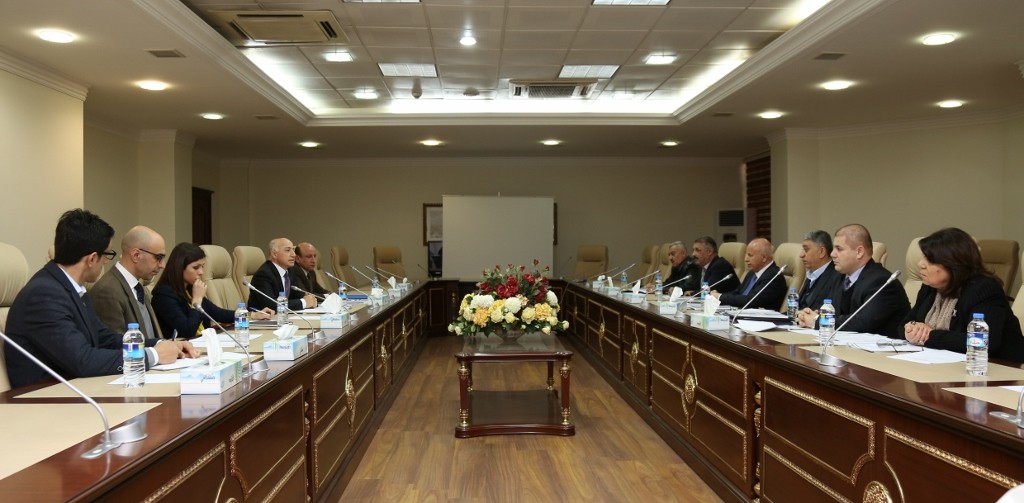On February 4, 2015, MERI submitted to the Ministry of the Interior the final draft amendment of the Law of Combating Domestic Violence in the Kurdistan Region, Act No. 8 of 2011. This draft is the product of an extensive review process and integrates the different draft amendments of Act No. 8, which have been produced thus far, including the ‘Duhok Draft’ of 2012.
To close the existing loopholes in the current law and propose new amendments, MERI’s Democracy & Governance team embarked on a six-month review process with NGOs, government officials from the General Directorate of Combating Violence Against Women, civil society organizations and legal experts. After a series of roundtable meetings, debates and workshops, the stakeholders involved agreed unanimously on the final draft.
Following this, MERI has now delivered the draft amendment to the Minister of Interior, Karim Sinjari, who acknowledged the efforts and the hard work of those involved in the process of producing the draft. According to Kurdistan Region’s legal procedures, the draft law will now be submitted by the Ministry through sending an official letter to the Speaker of Parliament. Subsequently, it will be sent to the relevant Parliamentary committees for review.
The need for amending the Law of Combating Domestic Violence was once more highlighted after UNICEF’s first ever KAP Survey on Female Genital Mutilation (FGM) in the Kurdistan Region. The study was conducted in 827 households in Erbil and Sulaimany governorates, including Garmian as a sub-district, and indicates that out of the 258 women responding, 58.5% were subjected to FGM. Tradition, with 66.1%, and religion, with 46.0% of those polled, are seen as the most common reasons for FGM.
FGM is a long-standing cultural practice, not only in the Kurdistan Region and the Middle East, but also in the rest of Asia, in over 27 African countries, and among diaspora communities around the world. The practice has been internationally classified as a violation of the human rights of women and girls. Due to the high percentage of the practice on minors, FGM is also considered as one of the grave violations of the rights of children. In Kurdistan Region, the average age at which FGM is carried out on daughters and other female relatives is five years.
It is worth mentioning that Kurdistan Region’s Act No. 8 is the first of its kind in Asia to address FGM. Nevertheless, further amendments to the law are fundamental for the eradication of both, domestic violence and FGM.
According to the Report, mothers are the biggest FGM supporters in the family. 75% of the polled believe that mothers mostly control the FGM decision. The role of parents is however absent in the current Act No. 8 of 2011. The proposed draft amendment addresses this issue, and if passed, the new law will make it punishable for relatives of first degree (parents, siblings, children) to carry out or provide aid in carrying out FGM. Moreover, medical practitioners will have a legal duty to report witnessed cases or any information they have on FGM carried out on minors.
The UNICEF Report also notes that the mutilation rates increase roughly with age, suggesting that the practice of FGM has declined over time. This decline is however very marginal. Considering the magnitude of the FGM phenomenon, adequate legal protection and education remain necessary to combat this widespread practice.
FGM is not only traumatic but also highly dangerous and often leads to chronic health issues, or even death. The practice thus violates a person’s rights to health, security and physical integrity. It infringes the right to be free from torture and cruel, inhuman or degrading treatment, and ultimately, the right to life when the procedure results in death. Providing for an effective and adequate legal framework, together with raising awareness and education, is therefore fundamental for the protection of the lives of women and young girls in the Kurdistan Region.
The final draft law which has been submitted to the Ministry of Interior can be consulted here.
* * * * *
About MERI: The Middle East Research Institute is Iraq’s leading policy-research institute and think tank. It is an independent, entirely grant-funded not-for-profit organisation, based in Erbil, Kurdistan Region. Its mission is to contribute to the process of nation-building, state-building and democratisation via engagement, research, analysis and policy debates.
MERI’s main objectives include promoting and developing human rights, good governance, the rule of law and social and economic prosperity. MERI conduct high impact, high quality research (including purpose-based field work) and has published extensively in areas of: human rights, government reform, international politics, national security, ISIS, refugees, IDPs, minority rights (Christians, Yezidis, Turkmen, Shabaks, Sabi mandeans), Baghdad-Erbil relations, Hashd Al-Shabi, Peshmarga, violence against women, civil society. MERI engages policy- and decision-makers, the civil society and general public via publication, focused group discussions and conferences (MERI Forum).


